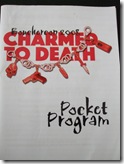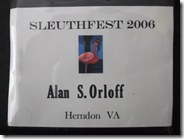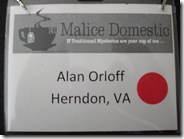Hi, Friends. Welcome back. Yesterday we looked at the lighter side of agent pitching in person. Today is all business. We continue with Shirley Kennett, the 2009 ThrillerFest Chair of the International Thriller Writers organization. Shirley’s post resumes below. It’s packed with useful, practical information you can actual use. Let’s get to it…
Your Agent pitching experience need not be a disaster. Of course you’re nervous. You’ve waiting months for this, your stomach is flip-flopping to one degree or another, and you feel like your personal worth is on the line.
So the first piece of advice is this: Rejection isn’t personal. When an agent says no, he’s saying that your work is not right for him. Nothing more, nothing less. It’s not an appraisal of your writing because—check the interaction (from yesterday) carefully—the agent hasn’t actually seen any of your writing.
Let’s talk about what you need to accomplish when you pitch, and then we’ll break down each of those things in detail. I like to start with this:
—Sell your story + Sell your character + Sell yourself = Successful Pitch!—
Sell your story
Every thriller story has heat in it, by which I mean the parts that truly excite a reader and therefore an agent or editor. What you want to talk about when you first sit down for your pitch is heat, heat, heat and nothing else about your story. The rest can come later in conversation with the agent.
So what is heat? Heat is the concept of your story expressed in a few sentences, or even a few words. Think sound bytes. This is heat:
—A forensics expert has just hours to unlock the secrets of a decade-old murder and untangle greed, incest, and evil to save the life of the woman he loves.
—A woman flees into the Ethiopian wilderness with a baby whose birth was foretold by ancient legends, and struggles against the hostile land and pursuing enemies to save a child destined to unite warring tribes.
—A CIA agent discovers that deep cover terrorist cells in different countries are receiving directions via typos inserted in online and print publications to launch a dirty bomb attack in six hours—somewhere.
—A man kidnaps the son he believes is a cult member and takes him to an isolated spot for deprogramming. Instead, in a psychological twist, the man succumbs to the cult and becomes enmeshed in violence and a plot to assassinate a presidential candidate.
These pitches are a little long and could certainly use some polishing and tightening. I just made them up, but you’ve been working with a story you’re very enthusiastic about for months, so you should be able to come up with a hot opening. They all include a beginning, middle, and an end (or a strong hint of an end) in 45 words or less. Typical speaking time is about 15 seconds, if you have it memorized. And you will need to memorize your pitch.
Something that may get you started thinking is to do What If exercises. Think of your story in terms of “What if blah blah blah, only to discover that blah blah blah.”
For example:
—What if a detective works on a case originating 20 years ago, only to discover that his life closely parallels that of the victim…will history repeat?
—Or one from a book of mine: What if a woman sold her soul to a demon only to discover that 300 years later she wants it back?
These could make excellent pitches all by themselves. Your What If might be an excellent one sentence tag line for your book, meaning a line that gets repeated over and over like you are branding yourself. (You are beginning to do so right from the git-go.
Sell your character
Once past talking about your story idea, be prepared to talk about a few of the characters in your book, definitely the protagonist and villain. You need to convey your characters’ unique slant on life that distinguishes them from 1001 other protagonists and villains—and why they fit into your story so well.
Mention the setting of your book, since it has such a bearing on the story. Try not to make this a dry recital. Instead, have a few practiced descriptions in mind. Here’s an example that gives an agent a lot of information about your characters and is interesting rather than dry.
PJ Gray is forty-one, a psychologist, a newly-single mother, and pioneer in the field of forensic computer simulation working in St. Louis. She’s professional on the outside, a little vulnerable on the inside, intuitive, quick-witted, and struggling with the gap in respect that cops have for those who aren’t in the Job. Her senior investigator, Detective Schultz, has been saved from premature retirement by her program. He’s skeptical, curmudgeonly, not above bending the law in a good cause, extremely dedicated to his work, and will end up much more than a co-worker to PJ.
Note that this is the opposite of your writing, where you would show all this personality rather than tell it. In a pitch, you are in tell, not show mode. Character is extremely important. No matter how good your story idea sounds, if it is peopled by the dull dregs of the earth, an agent isn’t going to like it. There has to be some visible potential for conflict, interaction, and growth shown in your characters. The agent may ask questions about them. You’re supposed to know them well, so make sure it shows.
Other points to convey: your manuscript is finished and ready for review; the word count (85,000-110,000 could be typical—if significantly longer or shorter, you’ll need to discuss why); some subplots if there’s time, to show the depth of the story.
Sell yourself
An agent isn’t just showing interest in a story, he has to have confidence in your professionalism and has to be able to see you as a person he can work with in a long-term business relationship. Your agent does not have to be your dearest friend, but there has to be enough compatibility to make things work between you.
Show yourself off as a professional. Dress like you would for a job interview. That means business casual clothing at least. That automatically puts you ahead of the poor guy who didn’t get the message and finds himself the only person there in cutoff jeans with holes in strategic places and a Trekkies Forever t-shirt and flip-flops. In general, NY is a dressier town than most. A lot of the agents will be coming directly from their offices, dressed for work. Guys, at least pack the khakis and a collared shirt. Ladies, you know the drill.
Be prepared with a brief, non-wandering bio of yourself. If you have any special reasons why you are able to write your legal thriller or spy novel or military thriller with authenticity because you’ve been there and done that, now is the time to get that across.
If you have any publishing credits, be sure to mention them. If you don’t, don’t raise the subject unless asked.
Come prepared with business cards, and make the best use of them by putting the right information on. Don’t use your day job business cards (unless you have a really, really prestigious day job). On the front of the card, put a photo of yourself if you’re comfortable with that. Name, contact info (no home address needed), and your one line tag line for your book. No fancy script fonts that aren’t easily readable, no neon orange cards, just a businesslike approach. On the back of the card, if you want to include it, provide a longer description of your story, maybe four or five sentences.
Some agents will take your card, some won’t be interested. Don’t press. The reason for the photo on the card is this. One of the great things about pitching at conferences is the personal rapport that can develop very quickly. Your business card will help an agent remember not just your name, but put a face to that name, and a few words about your book to jog his memory. When you do make a submission after the conference, be sure to include your card as a refresher of your identity.
Also bring with you a one page synopsis, actually 3/4 of a page, because the bottom 1/4 should be a brief bio. Have this available, offer it if the agent is interested, and again don’t press. Should you bring something longer? Since you’re going to be carrying around the conference tote bag (looks like a small briefcase) anyway, you might as well put a full synopsis (5-10 pages) and the first 50 pages of your manuscript in there. This is something that you could mention you have, but don’t expect a lot of takers. The idea here is for the agent to say yes or no to your pitch and if yes, request a submission of additional material after the conference. You’ll be told what type of submission and if it should be by email or hard copy. Start working on your one page and full synopses early. They are difficult to write well, and not something to be dashed off at the last minute.
I want to end with some inspiring success stories from previous AgentFests. Here they are:
Jenny Smith: http://www.thrillerwriters.org/thrillerfest/2009/02/agentfest-gets-results.html
Mary-Frances Makichen: http://www.thrillerwriters.org/thrillerfest/2008/10/agentfest-scores.html
Graham Brown and Jamie Freveletti: http://www.thrillerwriters.org/thrillerfest/2008/04/it-could-happen-to-you-at-agentfest.html
Great points, Shirley. I learned a bunch. Hope you found something worthwhile as well.
Shirley can be reached at: infocentral@thrillerwriters.org
 The best ways to get your book on a bookstore’s shelves are personal visits to the store, phone calls, and emails.
The best ways to get your book on a bookstore’s shelves are personal visits to the store, phone calls, and emails.




